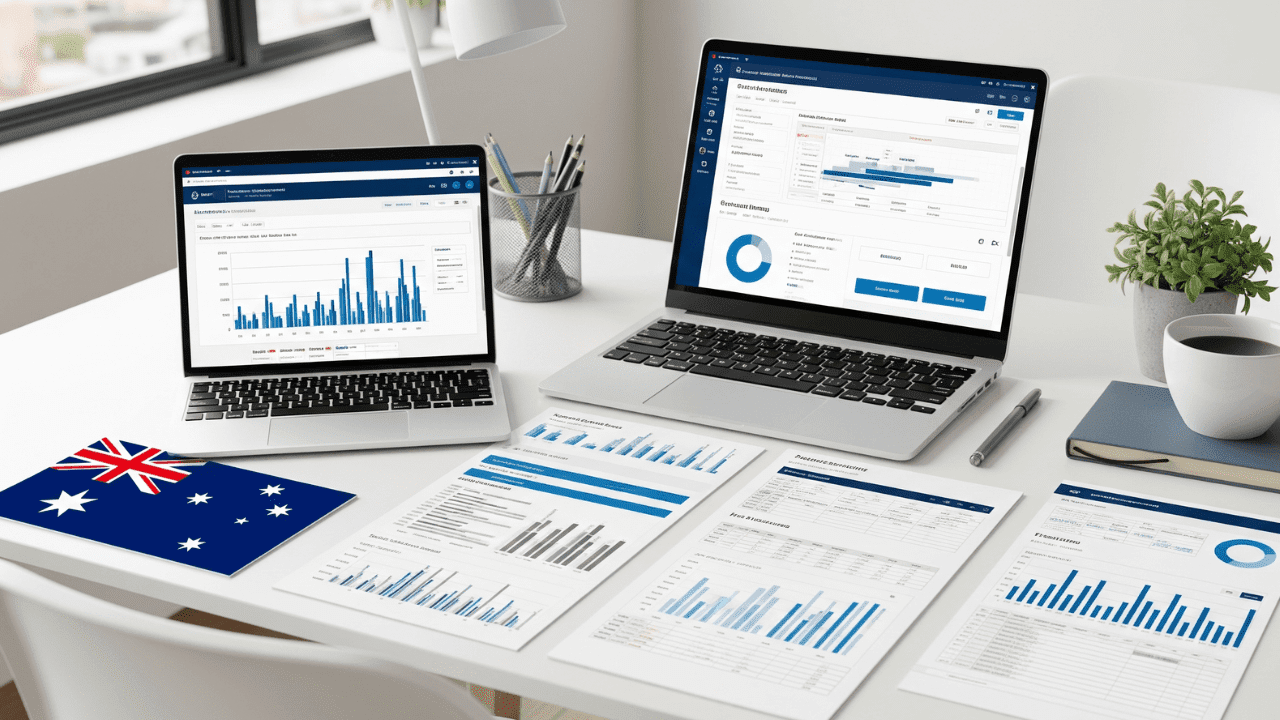What is BAS? A Business Activity Statement (BAS) is the official form Australian businesses use to report and pay taxes to the Australian Taxation Office (ATO). It covers several obligations, commonly Goods and Services Tax (GST) and Pay As You Go (PAYG) withholding or instalments.
Suppose your business has an annual turnover above $75,000 (or $150,000 for non-profits). In that case, you must register for GST and lodge a BAS regularly, monthly, quarterly, or annually, depending on your circumstances.
Your BAS reports the GST collected on sales, the credits you can claim on business purchases, and any PAYG amounts withheld from wages or paid as tax instalments. Even if your business had no transactions during a reporting period, you must still lodge a “nil” BAS by the due date.
Failing to lodge on time or submitting incorrect information can lead to ATO penalties, interest charges, or audits. That’s why small businesses in Perth should take BAS compliance seriously to avoid unnecessary risks and maintain good standing with the ATO.
When and How to Lodge Your BAS
Reporting periods and due dates: Most small to medium businesses file BAS quarterly. The due dates for each quarter are: Q1 (July–Sep) due by Oct 28; Q2 (Oct–Dec) by Feb 28; Q3 (Jan–Mar) by Apr 28; and Q4 (Apr–Jun) by Jul 28 (If a due date falls on a weekend or public holiday, it shifts to the next business day.) Larger businesses (GST turnover ≥ $20 M) report monthly – each monthly BAS is due on the 21st of the following month. Small companies that voluntarily register for GST and have a turnover under $75k may lodge annually, due by Oct 31 after year-end. Note: lodging electronically (online or via software) often grants you an extra 2-week extension on the due date. You may get even more time using a registered BAS or tax agent. Keep a calendar or reminder for your lodgement dates to avoid late penalties.
| Reporting period | Due date |
| Quarterly – July–Sept | 28 Oct |
| Quarterly – Oct–Dec | 28 Feb |
| Quarterly – Jan–Mar | 28 Apr |
| Quarterly – Apr–Jun | 28 Jul |
| Monthly (if required) | 21st of next month |
| Annual (voluntary) | 31 Oct |
Lodgement methods: The ATO supports several lodgement channels. The fastest way is online: sole traders can log in with their MyGovID and use the ATO app, while companies and trusts use the ATO Business Portal with an ABN. Many businesses now lodge BAS directly from their cloud accounting software (like Xero or QuickBooks) via the ATO’s Single Touch Reporting (SBR) system. Electronic lodgement is generally quicker and reduces errors.
Alternatively, you can have a registered BAS agent submit on your behalf. Using a BAS agent often means extra lodgement time and fewer admin worries. Agents can submit through their systems and even give you extended deadlines. If you still use a paper BAS form, fill it out carefully and mail it to the ATO’s address. (Any mistakes on paper require manual correction.) Finally, if your BAS is nil (no sales or GST), you can lodge it by calling 13 72 26 and using the automated phone service.
Common BAS Lodgement Mistakes
Avoiding mistakes is key when lodging BAS. Some typical pitfalls include:
- Incorrect GST reporting: Mixing up GST-inclusive vs. exclusive amounts leads to wrong figures. For example, claiming GST credits on GST-free purchases (like medical items or from a non-GST-registered supplier) is not allowed. One case found a business claiming the full GST on a vehicle purchase and then again on monthly lease payments – a double-claim that drew ATO attention. Double-check that your sales items are correctly coded (GST-free vs. taxable) and that you only claim credits on valid GST invoices.
- Record-keeping issues: Poor or disorganised records cause errors. Mixing personal and business expenses or losing receipts makes it hard to justify figures. Good practice is to keep all tax invoices and use bookkeeping software to log sales and purchases as they happen.
- Omitting liabilities: Forgetting to include all tax obligations (like fringe benefits tax, luxury car tax, or fuel credits, if relevant) will skew your BAS. Check which labels apply to your business and fill in “nil” if there is nothing to report in a section.
- Form and calculation errors: Simple data entry mistakes can occur, especially when filling in the wrong BAS label. Review each field – for instance, confirm that net GST equals GST collected minus GST credits. If lodging by mail, do not white-out mistakes – request a new form or lodge online instead.
- Late lodgement: Missing the due date can result in penalties and interest. The ATO may also review frequent late filers more closely.
You can lodge a clean BAS without surprises by catching these issues (for example, verifying all figures with your accounting records).
Tips for Lodging BAS Correctly
Lodging BAS is smoother when you follow best practices and get help if needed. Consider these tips:
- Use good accounting software: Cloud tools (Xero, QuickBooks, etc.) automatically calculate GST and PAYG totals and help label transactions correctly, reducing manual errors.
- Reconcile often: Balance your sales and bank accounts each month. Match receipts and invoices to your bank statements to ensure you base your BAS figures on accurate, up-to-date records.
- Set reminders: Mark BAS due dates in your calendar or use the ATO app. Starting your BAS prep early avoids last-minute rush and mistakes.
- Understand GST codes: Make sure you use the correct tax categories. For example, don’t claim GST on GST-free items (health, education, exports, etc.). Training your team or using clear chart-of-accounts categories helps avoid misclassification.
- Get professional help: A registered BAS agent can prepare and lodge your BAS. Agents are trained in ATO compliance and often spot errors before lodgement. Working with a BAS agent in Perth (like The Metier Group) can give you peace of mind and even deadline extensions. They can also liaise with the ATO on your behalf if questions arise.
- Organise bookkeeping: Keep your books organised year-round. Our bookkeeping and tax services help you accurately track income and expenses. Well-maintained records make BAS calculations clear, efficient, and error-free.
Following these steps will help you lodge BAS correctly and on time, keeping your business compliant and stress-free.
BAS Lodgement Checklist
A simple checklist can help you tick off every step before lodging:
- Confirm registrations: Ensure your ABN is active and you’ve registered for GST for the correct reporting period.
- Gather documents: Collect all sales invoices, purchase tax invoices, payroll and PAYG withholding records for the period.
- Calculate key totals: Work out total sales and total purchases. Compute net GST (GST collected minus GST credits). Verify PAYG withholding and PAYG instalment amounts.
- Fill all BAS fields: Enter figures in the correct labels. Report zeros as “nil” if nothing to claim. Don’t forget any obligation (e.g. FBT, LCT, WET) that applies to your business.
- Double-check everything: Compare your BAS numbers against your accounting records. Fix any mismatches. (If you lodge electronically, review the form preview. On paper forms, consider getting help to avoid crossing out errors.)
- Lodge and pay: Submit your BAS via your chosen method and pay any amount owing by the due date. Keep a copy of the lodged BAS and payment receipt for your records.
- Plan for next time: Note any lessons learned (e.g. improving record-keeping) so future BAS lodgements go even smoother.
Following this checklist, each quarter/period will help you avoid common pitfalls and stay compliant.
Ready to lodge with confidence? For expert help and a worry-free process, contact The Metier Group today. Our Perth-based registered BAS agents can accurately prepare and lodge your BAS. Visit our BAS Agent Services or contact us to learn how we handle your BAS and bookkeeping needs. We lodge your BAS correctly and on time, so you can focus on growing your business.







